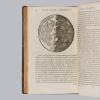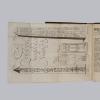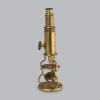A Scientific Revolution
Commentary
A Scientific Revolution
During the 17th century, the development of microscopes and telescopes transformed the observation and interpretation of nature, and encouraged new ways of thinking about the world. Scientific research became more systematic and better organised. The Royal Society of London, now the oldest national scientific institution in the world, was founded in 1660. Its activity and publications placed England at the centre of revolutionary advancements in the conduct and communication of science. Within this environment, and in regular contact with members of the Royal Society, Browne’s curious mind was at work.






